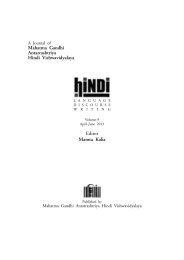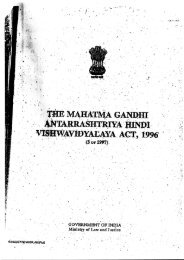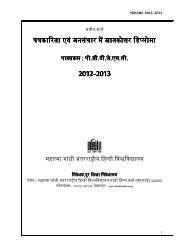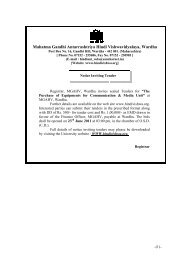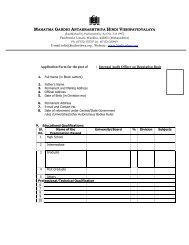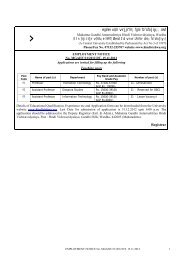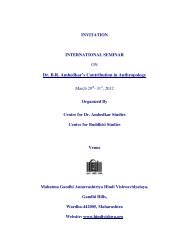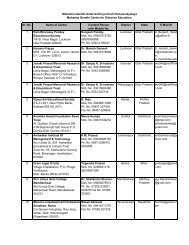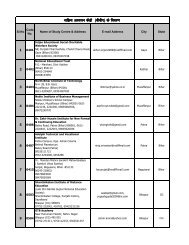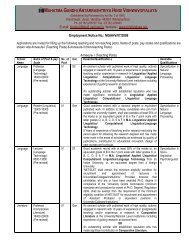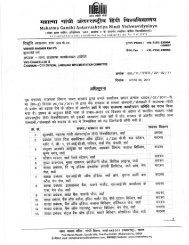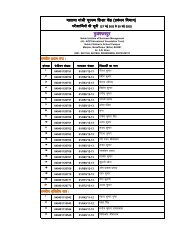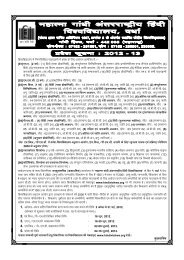A Journal of Mahatma Gandhi Antarrashtriya Hindi Vishwavidyalaya
A Journal of Mahatma Gandhi Antarrashtriya Hindi Vishwavidyalaya
A Journal of Mahatma Gandhi Antarrashtriya Hindi Vishwavidyalaya
You also want an ePaper? Increase the reach of your titles
YUMPU automatically turns print PDFs into web optimized ePapers that Google loves.
1. History <strong>of</strong> India, and other countries.<br />
2. Biographies <strong>of</strong> great and eminent<br />
personages all over the world.<br />
3. Historical plays.<br />
4. Novels.<br />
5. Contemporary/Current Indian<br />
Politics.<br />
6. Science.<br />
7. Critical Reviews.<br />
Within its ambit was published Sapreji’s<br />
‘Swadeshi Movement and Boycott’ in<br />
August, 1906, where the significance <strong>of</strong><br />
the Swadeshi Movement and the meaning<br />
<strong>of</strong> boycott was clearly explained. The book<br />
documents in detail the imperialist<br />
exploitation and plunder <strong>of</strong> India by the<br />
British regime resulting in India’s<br />
impoverishment. Driving home his point<br />
forcefully he says, “So long as India doesn’t<br />
attain Swaraj, efforts in other directions<br />
will fail.” He was confident that India would<br />
definitely attain Swaraj, because, in the<br />
History <strong>of</strong> the world, there is not a single<br />
example <strong>of</strong> a powerful country holding<br />
the weaker one in an endless bondage<br />
<strong>of</strong> unremitting slavery.” How could the<br />
government allow the publication <strong>of</strong> such<br />
a book? Hence, it was possibly banned<br />
in 1909. A study <strong>of</strong> “Swadeshi Movement<br />
and Boycott” makes it evident that Madhav<br />
Rao Sapre was greatly influenced by Tilak.<br />
In order to propagate Tilak’s views on<br />
colonial rule and Nationalism, he launched<br />
“<strong>Hindi</strong> Kesari”. The motive behind it was<br />
to establish a parallel to the “Marathi<br />
‘Kesari’ started by Tilak, so that the former<br />
would create some impact in the <strong>Hindi</strong><br />
speaking belt, that the latter had done<br />
in Maharashtra.<br />
It advocated the use <strong>of</strong> Swadeshi goods<br />
and the boycott <strong>of</strong> foreign ones, it brought<br />
out the significance <strong>of</strong> Swaraj and<br />
emphasized upon national pride and selfesteem.<br />
It boldly supported various<br />
movements and spoke in favour <strong>of</strong><br />
revolutionaries. Besides dealing with the<br />
basic values it also contained translated<br />
essays taken from ‘Kesari’. It fanned the<br />
government’s ire, which increased in direct<br />
proportion to its increasing popularity.<br />
As a consequence Deshraj Press, and houses<br />
<strong>of</strong> <strong>Hindi</strong> Kesri’s editors were raided on<br />
August, 22, 1908, and both editors—<br />
Kholhatkar and Sapreji were arrested. In<br />
the eyes <strong>of</strong> the government , this was<br />
the first act <strong>of</strong> treason committed in the<br />
History <strong>of</strong> <strong>Hindi</strong> <strong>Journal</strong>ism. Tracking him<br />
down the years one discovers the poignant<br />
moments <strong>of</strong> his life. Sapreji’s health had<br />
already deterioriated. It worsened during<br />
his three months’ imprisonment. His friends<br />
advised him to seek pardon and get his<br />
release, but he refused. Later, he was<br />
compelled to give in when his brother,<br />
Babu Rao threatened to commit suicide<br />
if Sapreji did not apologise to the<br />
Government. Being pushed into a terrible<br />
dilemma, he had to relent, thus, he put<br />
his signature on the letter <strong>of</strong> apology<br />
addressed to the government. This incident<br />
January-March 2012 :: 13



